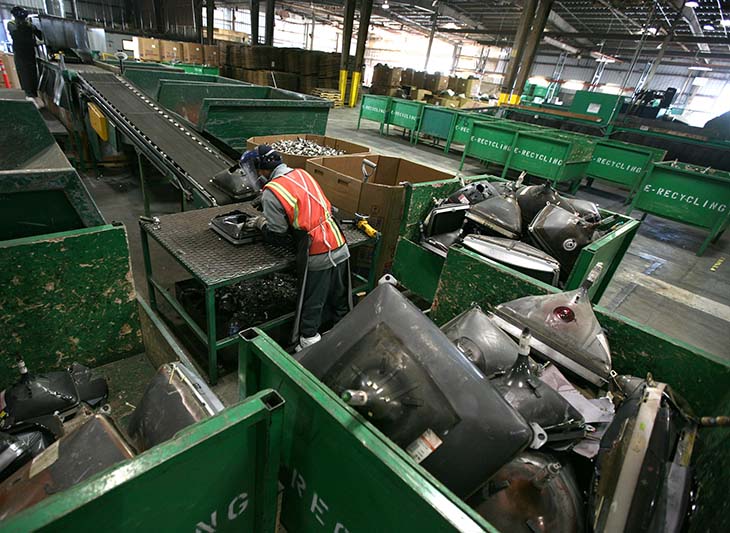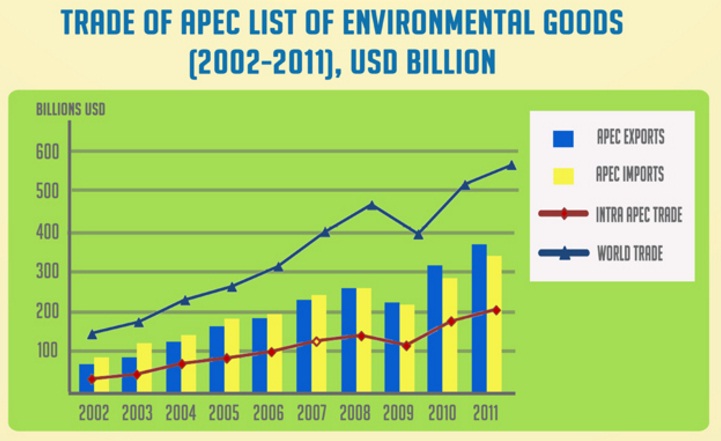Concerted effort in environmental protectionism
 |
| The APEC is at the right place to push environmental cooperation to the next level. Source: wwwapec.org |
The APEC has made remarkable progress in the past quarter century. A significant share of goods and services accrue little or no tariffs at all and good work has been done to deal away with barriers to trade and services. Additionally, most sectors are now open to international investment, signalling the remarkable headways made towards economic unity and the creation of a free trade area.
Riding on this remarkable momentum, the APEC economies find themselves at a place where they might start looking beyond trade policy and intensify efforts to achieve the far larger objectives set at their first meeting in 1993.
These objectives spelled out in the APEC Leaders’ Economic Vision Statement include coordinating policies to tackle emerging global challenges. In fact, a multitude of the current ails of humanity seem to strike the Asia-Pacific particularly hard.
Climate change and environmental concerns, connectivity, and joint human resources development are all on the list awaiting closer cooperation.
APEC economies are now in the right place to work out a specific roadmap to tackle the most urgent issues where concerted effort of the Asia-Pacific could affect unprecedented gains.
The weight of accord among the APEC economies has already been felt on the global scale when the APEC’s model of voluntary concerted unilateral decision-making led to the Nationally Determined Contributions of the Paris Agreement.
As developing economies are subject to the most adverse effects of climate change, a particularly strong accord among the APEC economies was born, creating some much-needed pressure to facilitate a stronger stance on climate change. The concert was somewhat understandable: about 70 per cent of natural disasters occur in the Asia-Pacific region, according to the APEC website.
| Growing concerns across Asia Agribusiness magazine Far Eastern Agriculture cites a meeting of Agriculture Ministers from the APEC in Vietnam as claiming that many key agricultural regions in Asia are already at risk of crossing key climate thresholds after which the productivity of plants and animals goes into decline. For instance, an FAO research states that certain regions in Asia are already near the heat stress limits for rice, a focal crop of APEC agricultural production. |
As the APEC also account for 60 per cent of the global energy consumption, it is imperative to reduce the portion of fossil fuels in the regional energy mix to mitigate the growing damage caused by climate change. The accelerating industrialisation and urbanisation across the member economies are a particular cause to step up environmental protection and sustainability efforts as energy demand and consumption levels are set to skyrocket by 2020.
Concerted action has obvious benefits in as much as it creates unified international response to problems transcending the toolkits of national decision making, boosting the efficiency of mitigation efforts.
The cooperation of APEC economies, a sizeable bloc of many of the globe’s developing countries and prime victims of climate change and other transnational security threats, makes for heavy pressure in the international scene, pushing for mitigation efforts along the lines of the common but differentiated responsibilities principle endorsed by the UNFCCC of 1992, as can be seen in the Nationally Determined Contributions of the Paris Agreement.
Showing a united front is not only a potent tool to better exert pressure in the international arena, but a precursor to regional cooperation on technology and know-how transfer. As a regional grouping, the APEC has significant internal depth facilitating the traffic of goods, services, people, and information among member economies.
Environmental protection, as such, has been on the table since the 1993 APEC Leaders’ Economic Vision Statement, but little has been done during the 1990s or the 2000s, even. Much of this can be ascribed to the fact that although APEC leaders envisioned a wider cooperation from the early stages, it has taken until 2011 to make the first significant step by agreeing to reduce energy intensity by at least 45 per cent by 2035.
The next step was made in 2013, when the APEC Foreign and Trade Ministers agreed to increase forest cover by 20 million hectares by 2020. Ministries also committed to promote sustainable forest management and enhance governance through institutional and legal frameworks, indigenous community participation, and strengthened efforts to combat illegal logging and associated trade, among others.
2014 proved a big year for environmental commitments, as the year saw both the Beijing and the Xiamen Declarations. In the Beijing Declaration APEC Energy Ministers vowed to double the share of renewables in the regional energy mix by 2030, while in the Xiamen Declaration ocean-related ministers identified four areas for collaboration.
| Four priority areas for collaboration in the Xiamen Declaration
|
The early 2010s saw sprouting environmental initiatives taking shape, such as the Green Towns initiative, a series of low-carbon model town projects helping urban planners formulate feasibility and development plans for reducing their city’s carbon footprint by setting carbon dioxide emission targets and initiatives from solar power to electric motorbikes.
According to the APEC website, the initiative has so far been implemented in Tianjin (China) in 2011, Samui Island (Thailand) in 2012, and Danang (Vietnam) in 2013 and its next stop will be San Borja in Peru.
Another environmental cooperation method under the aegis of the APEC is the Clean Transportation initiative promoting clean energy for shipping. These projects running under the APEC Transportation Working Group focus on lowering the carbon footprint of marine transportation and promoting sustainable port development and construction. The APEC has also agreed to promote “the usage of electric vehicles and energy-efficient automotive components and standards across the region.”
The Adapting to Climate Change initiative is the venue for the APEC to collaborate with the United Nations Food and Agriculture Organization to assess the impacts of climate change on agriculture in developing APEC economies and to help local farmers adapt to changing weather conditions. The project models rainfall and temperature changes, analysing how they affect crop yield and identifying vulnerable regions.
The APEC Climate Center provides climate information, research, and technical support to help economies mitigate climate-related hazards. The center also runs regular symposia and seminars as well as the Outreach Program for Developing Countries.
APEC economies are also promoting trade in a wide range of environmental goods in the region—“from solar panels to wind turbines,” as put by the organisation website.
The original aim was to reduce tariffs to 5 per cent or less by the end of 2015. Throughout the years, the APEC economies grew from environmental goods importers (2002-2007) into slight exporters, a tendency that will hopefully continue, increasing the gap between exports and imports.
 |
| Source: www.apec.org |
As the APEC is gathering this November in Danang, Vietnam for another summit, member economies as well as the world at large are awaiting progress transcending trade policy and cooperation. With luck, such progress will be visited upon the field of environmental cooperation, further cementing unity and decisive action to a growing international concern.
What the stars mean:
★ Poor ★ ★ Promising ★★★ Good ★★★★ Very good ★★★★★ Exceptional
Latest News
More News
- Ford’s continuing efforts to make Vietnam’s roads safer (November 07, 2017 | 16:08)
- Viet Nam is trying to improve itself: PM (November 07, 2017 | 15:34)
- PM delivers keynote speech at Viet Nam Business Summit (November 07, 2017 | 11:34)
- APEC Vietnam 2017 special publication now available (November 07, 2017 | 11:32)
- Four Vietnamese entrepreneurs to attend APEC CEO Summit (November 06, 2017 | 20:38)
- State President: APEC shows strong vitality and resilience despite global upheavals (November 06, 2017 | 20:24)
- Concluding Senior Officials' Meeting kicked off in Danang (November 06, 2017 | 16:34)
- Vietnam’s proposals to generate new dynamism for APEC (November 06, 2017 | 15:42)
- APEC media centre in full swing (November 06, 2017 | 15:01)
- CSOM opens 2017 APEC Economic Leaders’ Week (November 06, 2017 | 14:55)
















 Mobile Version
Mobile Version